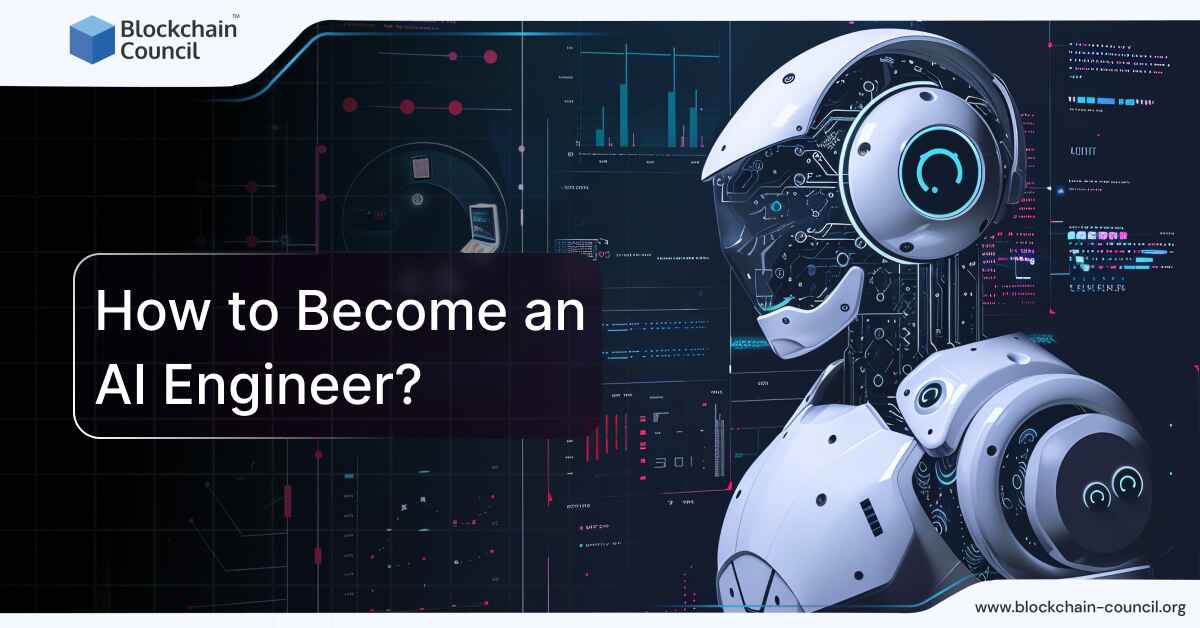
- Pradeep Aswal
- July 16, 2024
Introduction
Recent developments in AI, including advances in natural language processing and deep learning, have led to the creation of cutting-edge AI applications such as chatbots, autonomous vehicles, and personalized recommendation systems. These advancements have made AI a hotbed for innovation and investment, creating exciting opportunities for those looking to enter the field. Artificial intelligence (AI) has rapidly become a hot topic in the tech world, with its potential to revolutionize various industries, from healthcare to finance. As we enter a new era of automation, AI is predicted to become an integral part of our daily lives, leading to exciting new possibilities and job opportunities. Becoming an AI engineer is a great place to start if you are interested in pursuing a career in this field. However, it can be overwhelming to know where to begin. In this article, we will explore the future of AI and provide a step-by-step guide to becoming an AI engineer most effectively.
Also Read- The Potential Of Decentralized Artificial Intelligence In The Future
Why is AI Important?
AI has been around for a few decades, but recent advances in computing power, big data, and machine learning algorithms have made it more accessible and powerful than ever before. Today, AI is not just a buzzword but a crucial technology that can help businesses solve complex problems, make informed decisions, and improve customer experience. The global AI industry value is expected to increase by over 13x over the next 7 years
One of the most significant benefits of AI is its ability to process vast amounts of data quickly and accurately. With AI algorithms, businesses can extract insights from data that would be impossible for humans to identify. For example, in healthcare, AI can help doctors identify patterns in medical records that could lead to earlier diagnosis and treatment of diseases.
Another important advantage of AI is its ability to automate routine tasks. This not only saves time and reduces errors but also frees up human resources to focus on more creative and strategic tasks. In manufacturing, AI can help optimize production lines, predict maintenance needs, and improve quality control. In marketing, AI can help create personalized campaigns based on customer preferences, behaviors, and demographics.
AI also has the potential to drive innovation and create new business models. For example, in the insurance industry, AI can help companies develop more personalized and accurate risk models, reducing costs and improving customer satisfaction. In the transportation industry, AI can help optimize routes, reduce fuel consumption, and enhance safety. In finance, AI-powered robo-advisors can help individual investors make informed investment decisions at a lower cost.
Also Read- Everything You Need To Know About ChatGPT: Its Applications, Functioning, And Usage
What is an Artificial Intelligence Engineer?
Role and Responsibilities of an Artificial Intelligence Engineer
Artificial Intelligence (AI) Engineers are individuals who design, develop, and deploy AI-based systems that can be used and implemented by businesses, enterprises, or organizations. Their primary role is creating machine learning models and algorithms, such as image recognition software used by platforms like google lens or natural language processing which is massively used by AI chatbots like Sydney and Google Assistant.
They work closely with Data Scientists and Software Engineers to identify and solve complex problems using AI Engineering. Individuals must use Artificial intelligence to process complex data in internal systems and create sophisticated system structures.
Skills Required to become an Artificial Intelligence Engineer
Before you start your journey to learn artificial intelligence, you must understand that AI engineers must possess a unique set of skills, including strong analytical and problem-solving abilities, proficiency in programming languages such as Python and R, and expertise in machine learning and deep learning frameworks.
Job Description
Job Description and responsibilities for an AI engineer may vary depending upon the industry. Still, their primary responsibilities typically include the following:
- Develop AI models: An AI engineer is responsible for designing, developing, and training AI models like ChatGPT and Sydney. They also have to ensure that the models are apt for the purpose it was built for.
- Data analytics: an AI Engineer’s job is to collect and analyze the data using machine learning and deep learning algorithms to identify the pattern or any other shortcoming related to it.
- Deployment of AI Algorithm: AI engineer’s job includes writing the code that enables the functioning of the machine. The different algorithm codes work together to ensure the proper efficiency and working of the automated software.
Also Read- Decentralization in Web3: Benefits and Usages
Education and Training
There are multiple ways to start your journey as an AI engineer. There are traditional degree courses and online certifications which help you in gaining a complete understanding of the different technologies required to develop AI models for various purposes.
Degree Programs
Degree Programs are a proficient and recognized choice to learn about the basics of AI and skills like the logical interpretation of data and complex problem solving, which are necessary to become an AI Engineer. Some universities offer specialized degree programs in AI or machine learning too.
Degree certifications are often too expensive and have a large curriculum with some topics or subjects that are irrelevant to industrial or practical application. These shortcomings are a massive factor for a new-age learner who prefers an online course that provides practical knowledge needed in the industry.
Online Courses and Certifications
Online courses and certifications are a great way to obtain AI engineering training. The industry-specific approach in the course helps build a practical knowledge of the subject and increases. Blockchain Council offers dedicated AI certifications for AI development, allowing learners to understand the different aspects of Artificial Intelligence through its comprehensive and interactive course module.
This course explains the basics of AI and its application in the industry, like creating and managing algorithms, integrating Artificial Intelligence into the existing system, and more detail.
Online certification also offers training in programming languages, machine learning, and deep learning frameworks, as well as exposure to real-world AI projects. It helps gain the right expertise with a certification to boost your credibility of skills in AI development which will give you an upper hand while looking for a job in the domain.
Importance of Mathematics and Programming
Mathematics and programming are essential skills for AI engineers to understand Artificial Intelligence and its underlying working in detail. They should have a strong foundation in linear algebra, calculus, and statistics. Now to see how important mathematics is for Artificial Intelligence, we can take the example of self-driving cars that use minimization procedures and back-propagation for their work.
Programming is essential as it helps you apply the knowledge and build software and other solutions for your enterprise. With comprehensive knowledge and proficiency in programming languages such as Python, R, C++, or Java, it is possible to create a robust algorithm or AI solution.
Real-World Experience
Real-world experience helps you test the knowledge and skills you have catered to, and it can be done through an internship or a personal project. You can take part in competitions centered around AI development to test yourself against other individuals and work on the areas where you lack.
It helps you understand how to apply your knowledge in the real world and build a strong portfolio for jobs. Recruiters often ask for projects while hiring, so these projects will become crucial once you start looking for jobs in the domain.
Critical Technical Skills for Al Engineering
Apart from the necessary education and training, you should culminate in some critical technical skills like deploying AI systems and calibrating user data to perform complex machine learning operations, among others. It will help you to obtain a job quickly and become a valued talent in the organization.
Mathematics (Linear Algebra, Calculus, Statistics)
AI software and its proficiency depend on how well-versed the engineer understands the math required to do it. Mathematical knowledge is extremely important in Self Driving cars, Image Detection security systems, and even the Archeological Equipment calibration module, which utilizes Mathematical concepts like statistics and mapping functions.
Mathematics is a fundamental component of artificial intelligence (AI) since AI involves the creation of algorithms that analyze and manipulate complex data. Mathematical concepts such as linear algebra, calculus, probability theory, and optimization are critical to developing AI models that can accurately recognize patterns and make predictions.
These mathematical concepts are used to design and train machine learning algorithms, develop neural networks, and optimize data models to increase their predictive accuracy, which is then employed to develop chatbots and more software like Face ID used by Apple in its devices. Therefore, a strong foundation in mathematics is essential for anyone interested in pursuing a career in AI.
Programming (Python, R, C++, Java)
Programming is how you build a structure to deploy and implement your algorithm and build a software or AI solution. To create any software or AI system, AI engineers should be proficient in programming languages such as Python, R, C++, or Java.
Start your programming journey with a language like Python or c++, as they are easy to learn and implement. Python is also essential in training machine learning models, while Java and rust are majorly used for client-server web applications and android applications.
Machine Learning (Supervised, Unsupervised, Reinforcement)
Machine learning refers to the use of data to improve the functionality of the system and its efficiency over time. AI engineers should have expertise in machine learning algorithms and techniques, including supervised, unsupervised, and reinforcement learning.
Supervised machine learning refers to the use of structured data to make predictions. Unsupervised machine learning uses scattered data to look for patterns or similarities, i.e., academic research. The last type of machine learning is a reinforcement of data, where the algorithm learns and improves over time by utilizing the data provided to it regularly.
Deep Learning (Convolutional Neural Networks, Recurrent Neural Networks)
Deep learning is a subset of machine learning that involves complex neural networks, such as convolutional neural networks (CNNs) and recurrent neural networks (RNNs).
While recurrent neural networks create a cycle to reinforce the output to affect the subsequent input, convolutional neural networks extract the main features and data. As an AI Engineer, knowing the types of deep learning and how to use them in building software and other solutions is essential. Some organizations study the user data and provide solutions based on it, and constant lookout for individuals proficient in deep learning has become a norm in recent times.
Natural Language Processing (NLP)
NLP is a field of AI that enables computers to understand and process human language. As an AI Engineer, it is essential to understand the technical and applicative aspects of NLP for your software. Expertise in NLP has been a focal point when hiring individuals in organizations. One of them is open AI, the company which developed the language model GPT-3 and even the chatbot chatGPT.
NLP is also heavily employed in the sectors like Archeology to gain insights from millennia-old slabs found in ancient sites.
Computer Vision
Computer vision involves enabling computers to analyze and interpret visual data. AI engineers should have expertise in computer vision algorithms and techniques. Its application is essential for organizations providing solutions in archaeology and academia.
Computer vision is also helpful in designing security systems and construction. It uses the data obtained through computer vision to create facial recognition software and design digital models for buildings.
Building a Strong Foundation in Al
Building a solid foundation in AI is very easy; you can start from general practices and gradually move towards understanding complex problems. Here are some topics to start building your foundation today.
Understanding Al Algorithms and Methods
AI engineers should deeply understand AI algorithms and methods, including machine learning, deep learning, NLP, and computer vision. You can help brands and organizations implement machine learning techniques and deep learning to utilize the data better and implement an advanced working module for their system infrastructure.
Deep learning and machine learning are extremely useful in making a model that can utilize the data to predict an outcome or find a pattern in a cluster of data, which is used in weather monitoring or social media apps to curate the content. NLP and computer vision are also used in AI assistants like Alexa and self-driving cars.
Staying Current with Advancements in Al Research
AI is a rapidly evolving field, and AI engineers should stay current with AI research and technology advancements. You can attend conferences, read research papers, and participate in online communities. It can help the brand to build solutions based on the new advancements and tech ahead of its competition.
Building AI Projects and Portfolios
Building AI projects and creating a solid portfolio are essential for AI engineers. This demonstrates their technical skills and ability to apply AI technologies to real-world problems. Once you start building projects in the real world, your ability to use your problem-solving skills and create SaaS and PaaS leaps and makes you a valuable asset for your brand.
Collaborating with Other AI Professionals
AI engineers should collaborate with other AI professionals, including Data Scientists, Machine Learning Engineers, and Software Engineers. This collaboration can lead to the creation of more comprehensive and effective AI solutions. Collaboration also helps to understand what skills are more valued in the jobs, and the roadmap required to work on them can be gained by collaborating with experienced folks in the field.
Career Opportunities in Al Engineering
Artificial Intelligence is the hotbed for opportunities, with more and more brands making Artificial intelligence an essential part of their systems infrastructure, user experience, and solutions. Newer blockchains and Web3 applications heavily rely upon AI to perform tasks like simplifying user interaction with the blockchain. Career opportunities are poised to grow with the increasing user base of Blockchain applications.
Job Titles and Salaries
The job titles for AI engineers may vary, but standard titles include AI Engineer, Machine Learning Engineer, and Data Scientist. They are employed at all levels and sectors, from software companies to academia, with the job title changing over time and the role they perform for the organization. The average salary for an AI Engineer is around $120,000 per year, but this may vary depending on location, industry, and experience.
Job Outlook
The job outlook for AI engineers is excellent, with a projected growth rate of 15% from 2019 to 2029 in a recent report by the bureau of labor statistics. As more industries adopt AI technologies, the demand for AI engineers is expected to increase. Organizations that were hesitant to employ AI in their products are now changing their position with the increasing viability of AI and the proficiency of solutions that will be made using it.
Industries Hiring AI engineers
Many industries are hiring AI engineers, including healthcare, finance, manufacturing, and technology. The research-based or product-based industries are hiring the most individuals as they benefit the most from the recent rise in interest in AI. The recent surge in interest is due to the increasing use of AI, like fine-tuning the recently launched AI models like GPT-3. These industries use AI technologies to solve complex problems and improve efficiency.
Future of Al Engineering
The future of AI engineering is promising, with continued advancements in AI technology and increased adoption of AI solutions. AI is a massive component in the rise of Metaverse, too, be it the creation of avatars based on real humans using computer vision or complex algorithms to design the inworld characters who can learn over time.
Recent chat models like Sydney by Binge are just a glimpse of what AI Engineering will look like. Giants like Google and Meta are heavily investing resources in AI to develop their chat models and integrate them into their services, hinting about the prospective boom in the sector.
Conclusion
Becoming an Artificial Intelligence Expert requires unique skills, including strong analytical and problem-solving abilities, proficiency in programming languages, and expertise in AI technologies. While there are multiple certifications and AI Engineering programs, Blockchain Council is the leader in AI courses, curated and designed by experts to help you train and learn the necessary skills to become a proficient AI engineer.
FAQ’S
What do you need to be an artificial intelligence engineer?
To become an AI engineer, you need a degree in computer science, math, or a related field, as well as experience with programming and machine learning.
How can I become an AI engineer after 12th?
To become an AI engineer after the 12th, you can pursue a bachelor’s degree in computer science or a related field and gain experience through internships and personal projects.
What is the salary of an AI developer?
The salary of an AI developer varies depending on location, experience, and industry but can range from around $80,000 to over $150,000 per year.
AI is a rapidly growing field with many opportunities for career growth and development, making it a good career choice for those interested in technology and innovation.
AI engineers need coding skills to design, develop, and implement machine learning algorithms and models. Python is a common language used in AI development, but other languages may also be used.
































































 Guides
Guides News
News Blockchain
Blockchain Cryptocurrency
& Digital Assets
Cryptocurrency
& Digital Assets Web3
Web3 Metaverse & NFTs
Metaverse & NFTs
